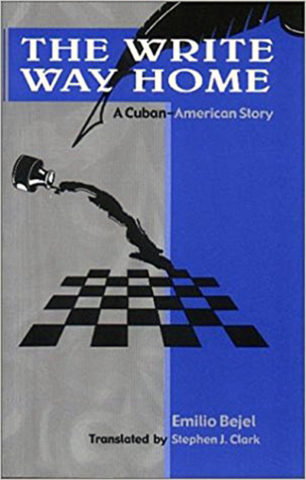 The Write Way Home
The Write Way Home
by Emilio Bejel
Published by Versal Editorial Group
Published April 15, 2003
History (memoir)
247 pgs. • Find on Amazon.com
Reviewed by Stephen O. Murray
July 15, 2003 (?)
Emilio Bejel’s The Write Way Home is a relatively straightforward memoir of a life heavily impacted both in Cuba and in the United States by the Castro revolution and dictatorship.
Even the title pun has one fairly literal meaning: the boy who was expelled from high school in Cuba became a professor of Spanish-language literature and, starting 16 years after his flight to Miami, began visiting his homeland as a writer. The book does not exhibit any of the torturous prose and abstract theory literature professors (including Emilio Bejel in his academic writing) generally engage in. It does not “problematize” narrative but lays one out. The narrative is not quite chronological. It veers back and forth like memory does, and includes some disconcerting flashes forward I’ll discuss in a bit.
Emilio Bejel was raised by his mother and two of her sisters (one divorced, one never married) in the house of his maternal grandfather, who was an “old goat” vigorously hitting on women into his mid-90s. The family was anti-Batista with one aunt sheltering a wounded follower of Castro before the Batista regime evaporated. The young Emilio was a Catholic Youth activist and a strategist in high school politics that pitted young Catholics against young communists. His side won the battles, but lost the war, and as the Castro regime became more overtly communist, Emilio was expelled from school.
He left Cuba with only the clothes on his back in 1962 at the age of 18. In Florida, he worked picking tomatoes and doing other menial jobs while finishing high school. After a year of junior college, he got into the University of Miami, went to Florida State for graduate school, earned a Ph.D. in 1970, and was a full professor by 1980. There is very little in the book about the work he did to make this rapid ascent possible. He does not mention his thesis topic(s) or mentors.
There is more about his sexual awakening (though this tends to be more analytic than salacious) and some detail about the repression of alternative sexuality and gender-nonconformity in his Cuban growing up (especially in the chapter “The Well-Dressed Boy”). The most vivid parts of the American memoir concern “failing” his draft physical and avoiding being murdered by a crazy New Yorker.
In 1978, Bejel was among the first Cuban Americans who traveled to Cuba. He became acquainted with his father and was adopted de facto by his stepmother. He also revisited his relatives on his mother’s side and observed some of the positive fruits of the regime for the poor without forgetting that he had been forced to leave, forced to witness executions before leavings, or that the Castro regime denied freedom of expression to Cubans in Cuba.
A view of Castro’s revolution as having some positive effects was and is heresy to some Miami hard-liners, and Bejel was accused of being a Castro spy after he took up a position at the University of Florida. He was also the target of obviously spurious claims about academic freedom that are typical of the double-talk right-wing attack on academics. Documents from the controversy that exploded when the University of Florida trustees were ratifying tenure awards in 1984 are spread through the volume.
I think that the juxtaposition of these documents and the memoir (more than a few chapters of which end in poetic dialogues and monologues) was a mistake, particularly in that the very first one is almost all accusations and is inserted before the chapter on his high school daze. I think they would have been better gathered into an appendix or at least laid out within the chapter (that begins 156 pages later) on the attempt to keep someone with moderate views on Cuba out of a position teaching Caribbean literature within the state of Florida.
Bejel cannot be accused of bullying readers, which makes it unlikely he bullied students into sharing his views. The intersection of his own life and Cuban history, Cuban American politics, the Cold War, and changing sexual politics in both Cuba and the U.S. make for interesting and thought-provoking reading.
Bejel shares the lust for life and some of the horniess of Reinaldo Arenas’s memoir Before Night Falls. Bejel was younger than Arenas, got out of Cuba eighteen years earlier, and was not infected with HIV in the U.S., as Arenas quickly was. Bejel’s experiences of both Cuba and of the United States have been less traumatic than Arenas’s, though by no means untraumatic. Bejel does not write with Arenas’s consuming rage and is not primarily providing Testimony against the Castro regime (although his narrative shows some very unpalatable features of reigns of terror in Cuba and alludes to others).
The Write Way Home is, no doubt, insufficiently single-minded to please the Cuban American hard-liners in Miami, but it documents the toll on himself and on his family(/ies) back in Cuba of communism and anticommunism on both sides of the Florida Strait.
©2003, 2017, Stephen O. Murray

